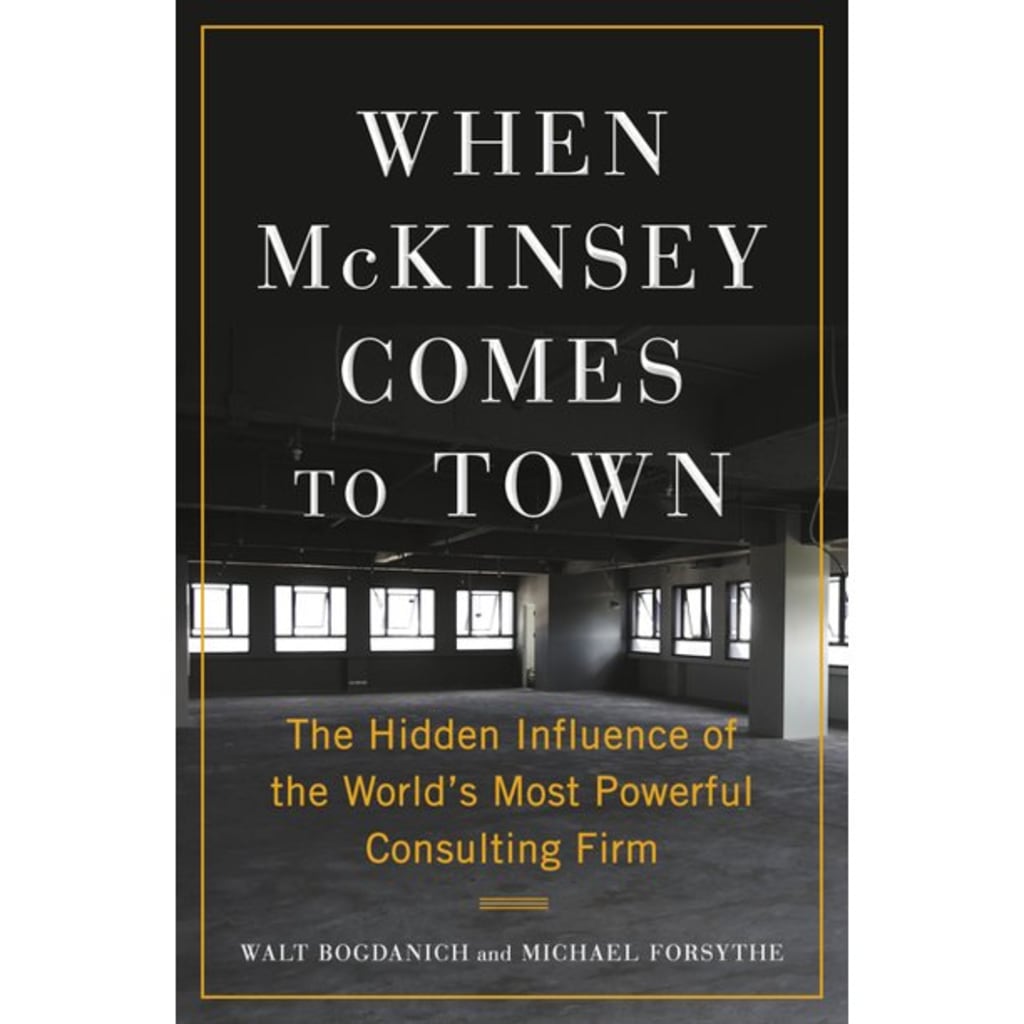Book Review: When McKinsey Comes To Town
Preaching RIGHT, Doing WRONG

Author: Walt Bogdanich & Michael Forsythe
Rating: Four out of Four "Consultant-ese jargon words"
Ease Of Reading: 368 pages.
When To read: After the consultant your employer hired to "improve efficiency" steals your ideas and calls them "deliverables."
I worked for a Fortune 30 company for almost 40 years. During that time, the company hired consultants every few years to either improve efficiency, develop a strategic plan, or foster organizational change. I learned that efficiency means layoffs, organizational change means layoffs, and developing a strategic plan means more layoffs.
Authors Bogdanich and Forsythe are New York Times reporters with years of investigative reporting experience and prizes that demonstrate their skills. The book is exhaustively researched, well-written, and meticulously organized.
The authors have chosen the Harlem Globetrotters of consulting as their target, McKinsey. Why that analogy? Because the Globetrotters are exquisite showmen who play in a simulated game where they always win. McKinsey operates under the same rules, constantly burnishing their impeccable credentials while simultaneously slumming with bloodthirsty dictators, environmental criminals, or greedy, grubby, opioid manufacturers.
The authors begin with a history lesson. James O. McKinsey, a University of Chicago professor and expert on management accounting, founded the consulting company in 1926. But it was Marvin Bower in the 1930s who truly established McKinsey's core values. He insisted upon calling the company a "firm," and he solidified a climate of dissent. Bower introduced impeccable professional standards in substance, ethics, and style, and he was insistent upon the professional development of his colleagues.
The authors do their homework, often telling their story through the eyes of ex-McKinsey employees who had become disillusioned at McKinsey's ongoing disparity between their stated core values and what they actually do.
The authors begin with McKinsey's work for U.S. Steel in Gary, Indiana. There, McKinsey developed a strategy to layoff employees to cut costs, raise the stock price which enriches top execs and investors, and implement a "don't buy, get by" policy that cost the lives of at least two steelworkers.
After that first chapter, the book is an investigation of how McKinsey's values are at odds with its practical profiteering, working for friend and enemy at the same time, advising bad actors like tobacco companies, opioid companies, coal mines, and even insurance companies.
Here's a quote from the book's notes, "In one telling example, McKinsey advised a Chinese engineering company allied with the communist government which constructed artificial islands, now used as staging grounds for the Chinese Navy--while at the same time taking tens of millions of dollars from the Pentagon, whose chief aim is to counter Chinese aggression."
The authors wisely connect two events that show up in McKinsey's mad chase for profits in consulting contracts seventy years apart. In the 50s, just as the government, science and consumers learned about the health consequences of smoking tobacco, McKinsey was there giving tobacco companies advice on how to blunt the science of nicotine's damage to the human body. Then, 60 years later, McKinsey consulted with vaping companies that, of course, were the same tobacco companies McKinsey had so arduously defended in the 50s and 60s. In the 2010s, McKinsey was on the front line of protecting opioid companies like Purdue Pharma when thousands were becoming addicted and more were dying.
Chapters later in the book detail McKinsey's involvement with Enron, how it encouraged Allstate to deny insurance claims to improve profits, and its disaster in South Africa.
Some reviews of the book seem harsh, largely driven by the myth that the New York Times is just the progressive alternative to Fox News. But this book deals in facts that are carefully notated and uncovered by two reporters who battled a company known for its secrecy.
But if you read the book, absorb those facts and build a greater meaning of McKinsey's continued malfeasance, you actually get a bird's eye view of "the deep state" from both political perspectives.
People on the right see "the deep state" as the government engaged in all kinds of wrongdoing. The authors point out McKinsey's outsized role in governmental, or deep state, chicanery, whether that the government is the United States, Saudi Arabia, or China. People on the left have the Bernie Sanders view that the rich have controlled the money and the power that comes along with it. Witness McKinsey's role in recommending massive layoffs of middle-class workers just so top execs could get a bonus, hedge fund managers could prosper, and large shareholders rake in windfall capital gains.
In fairness, McKinsey should be a prime target regardless of political affiliation. The book is nicely organized by McKinsey's misdeeds, and so you can even skip around from their role in the financial crisis of 2007-2008 to their toxic presence at Britain's National Health Service.
If you are a skeptic, or suffer from oppositional disorder, you can make the case that investigative reporters have to find something to report on to make money or get noticed. Yet McKinsey -- because it claims the high ground on ethical purity and social responsibility -- makes for a gold mine of hypocrisy, duplicity, Satan-level evil, and either inventing or supporting the worst kinds of malevolent behavior -- from mass layoffs to boost the stock price to denying science when the client makes the product that kills people to playing both sides against one another -- FDA and drug companies -- so that their battle is your gold mine.
Leave your political prejudices at home and read this book. Then ask yourself: Who's the loser when McKinsey consults with large organizations and governments? The answer: YOU.
About the Creator
Frank Racioppi
I am a South Jersey-based author who is a writer for the Ear Worthy publication, which appears on Vocal, Substack, Medium, Blogger, Tumblr, and social media. Ear Worthy offers daily podcast reviews, recommendations, and articles.






Comments (1)
This is well written even if it's strong narrative - being a former McKinsey consultant myself I don't agree with all that's written but the way it is written is compelling